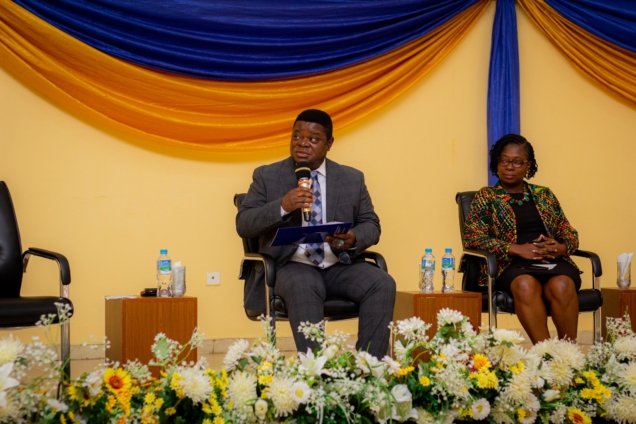Director of the Institute of Statistical, Social, and Economic Research (ISSER) Prof. Peter Quartey has been outlining the potential impact of the second round of the debt exchange in Ghana.
The renowned economist explained that the Program, initiated on July 14, 2023, in collaboration with the Ghana Cocoa Board, aims to restructure debt instruments, with a particular focus on the GH¢8.1 billion worth of Cocoa Bills and domestically issued US$-denominated bonds amounting to $808.99 million.
A noteworthy aspect of this exchange is the dramatic reduction in interest rates, plunging from an overwhelming 30% to a mere 13% for cocoa bill holders.
The restructuring extends to the creation of five new Cocoa bonds, set to mature between 2024 and 2028.
This allocation comprises 5.0 percent of the amount to be exchanged against the 2024 bond, 20.0 percent against the 2025 bonds, and 25.0 percent each against the 2026, 2027, and 2028 bonds.
For locally held US dollar-denominated bonds, the previous interest rate of approximately 6% has been transformed into two new bonds maturing in August 2027 (R=2.75% payable semi-annually) and August 2028 (R=3.25% payable semi-annually).
In addition to this extensive restructuring, the Ghanaian government is actively engaged in negotiations with pension funds, which hold a substantial GH¢29.2 billion.
This separate execution arrangement is designed to maximise the benefits of the debt exchange.
The scope of this transformation isn't confined solely to domestic matters; it extends to non-tradable debt held by the Bank of Ghana and encompasses the energy sector, including independent power producers (IPPs).
While there is undeniable promise in this second round of debt exchange, Professor Quartey also shed light on the significant adverse effects.
He argues that one of the foremost challenges is the substantial reduction in coupon rates, which poses a formidable hurdle for banks.
These financial institutions will be compelled to write down the value of their cocoa bills, resulting in a substantial reduction in interest income.
This dire consequence adds to the burden on banks that are already navigating the complexities of the financial landscape.
Furthermore, the debt exchange places a burden on domestic investors who are grappling with significant losses in real returns due to high inflation and the sharp depreciation of the Ghanaian cedi against the US dollar.
For both individuals and firms, the face value and real value of their funds are eroding, deepening the economic hardships they face.
Professor Quartey's insights into Ghana's second round of debt exchange underscore the potential for profound transformation in the nation's financial landscape.
While this initiative promises significant benefits, it also carries substantial adverse effects that warrant careful consideration.
Striking the right balance between hope and hardship will be imperative to ensure a sustainable and prosperous financial future for Ghana.
Latest Stories
-
VRA embarks on mission to recover all debt
4 hours -
GRA promises to refund all E-Levy deductions after April, 2025
5 hours -
Daily Insight for CEOs: Mastering strategic decision-making as a CEO
5 hours -
Chelsea beat Tottenham in London derby
5 hours -
Agbodza concludes 1-day tour of Western North Region; assures residents of improved road network
5 hours -
Ghana Evangelical Missions urges Ghanaians to embrace AI, technology for national development
5 hours -
Ntim Fordjour is running away from investigative bodies – Kwakye Ofosu
6 hours -
2 aircraft landed in Ghana for legitimate reasons, no unlawful substances were on them – Kwakye Ofosu
6 hours -
Operation Smile transforms lives with free corrective surgeries for children with cleft palate
6 hours -
Nii Lande Vanderpuye questions Black Stars progress despite big wins
7 hours -
Ntim Fordjour peddled falsehood over aircraft drug claims – Felix Kwakye Ofosu
7 hours -
Ennobled Foundation hosts inspiring connect session with young professionals
7 hours -
GhIPSS hosts Kenyan Central Bank on study tour, promoting collaboration in Payment Systems Development
7 hours -
Sekyi-Brown Reginald writes: Pharmaceutical sovereignty: A national security imperative for Ghana
7 hours -
Kwakye Ofosu is running away from accounting for the gold, currency, cocaine busted – Ntim Fordjour
7 hours

